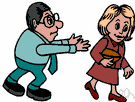wish
(wĭsh)n.
1. A feeling that one would like to have or do something or to see something happen; a desire, longing, or strong inclination for a specific thing.
2.
a. An expression of a desire, longing, or strong inclination: carried out the wishes included in the will.
b. An expression of desire for the happiness or success of another: sent me his best wishes.
3. Something desired or longed for: finally got his wish to see the ocean.
v. wished, wish·ing, wish·es
v.tr.
1. To long for; want. See Synonyms at desire.
2. To feel or express a desire for: I wish them good luck. He wished her good night.
3. To order, entreat, or request: I wish you to go. I wish it to be known that I disagree.
4. To desire (something bad) to happen to someone: I would not wish such an illness on anyone.
v.intr.
1. To have or feel a desire: wish for a successful outcome.
2. To express a wish.
[Middle English wissh, from wisshen, to wish, from Old English wȳscan; see wen- in Indo-European roots.]
wish′er n.
Usage Note: Wish is widely used as a polite substitute for want with infinitives: Do you wish to sit at a table on the terrace? Anyone who wishes to may leave now. This usage is appropriate for formal style, where it is natural to treat the desires of others with exaggerated deference. The corresponding use of wish with a noun-phrase object is less frequent: Anyone who wishes an aisle seat should see an attendant. Both usages are likely to sound stilted in informal style, however, and want may be substituted for wish. · A traditional rule requires the use of were rather than was in a contrary-to-fact statement that follows wish: I wish I were (not was) lighter on my feet. While many people continue to insist on upholding this rule, the indicative was in such clauses can be found in the works of many well-known writers. See Usage Note at if.
American Heritage® Dictionary of the English Language, Fifth Edition. Copyright © 2016 by Houghton Mifflin Harcourt Publishing Company. Published by Houghton Mifflin Harcourt Publishing Company. All rights reserved.
ThesaurusAntonymsRelated WordsSynonymsLegend:
| Noun | 1. |  wishing - a specific feeling of desire; "he got his wish"; "he was above all wishing and desire" wishing - a specific feeling of desire; "he got his wish"; "he was above all wishing and desire"desire - the feeling that accompanies an unsatisfied state velleity - a mere wish, unaccompanied by effort to obtain |
Based on WordNet 3.0, Farlex clipart collection. © 2003-2012 Princeton University, Farlex Inc.
Translations